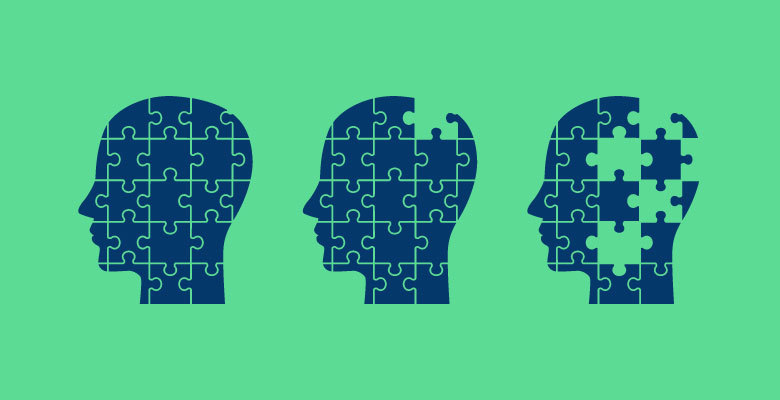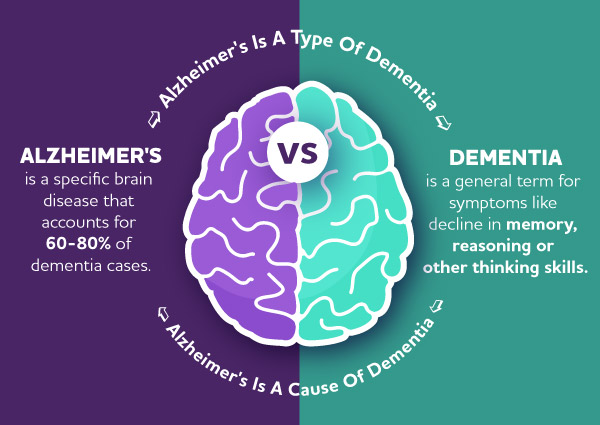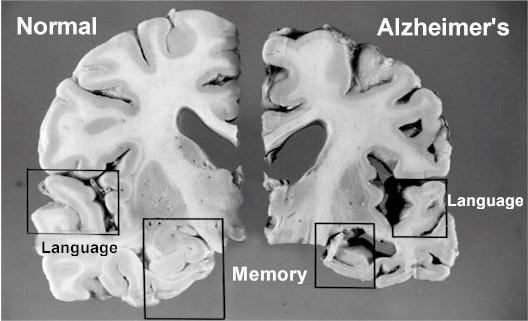

When mentioning the word dementia, many will subconsciously associate it with Alzheimer’s disease and the loss of memory that takes place when the brain starts to run out of fuel.
However, dementia care advocate, Dr. Cecilia Chan clarified that the condition is NOT a memory impairment but an umbrella term to identify a number of conditions that correspond to changes and damage to the brain.
“When one says they have dementia, they don’t have a diagnosis. A diagnosis is what kind of dementia they are going through. It’s not an old people’s disease,” she explained to the audience during the ‘Ugly, Forbidden Words and Dementia’ webinar.
She shared with us a comparison photo of a normal brain and a brain affected by dementia where an apparent change in size can be seen. The altering of the shape is caused by the structural and chemical changes; the brain shrinks from the inside and outside.
Behaviour is the illness, not the person
They are not demented people nor are they demented patients, hence, the respectful form of address is people living with dementia.
Cecilia shared that everyone learned something that they stored as a “special” language at some point in their lives. Say, a newfound word we acquired as a kid that is foul language. Since it is inappropriate in our culture, we will store it in a special place in our brain.
When one develops dementia, they will find it difficult to retain new memories but this old storage is usually secured.
“Have you ever been in a place, be it a workplace or a social place, where you will have a reaction toward something, but you don’t verbalise it? The mind will chatter and you will have questions such as ‘What is she doing ?’ or ‘Is she acting her age?’
“In other words, we make judgments because each of us have been exposed to our social Do’s and Don’ts. We label but because we have an intact brain, we don’t openly express our judgement,” she said.
As another example, think about the next time you slammed a car door on your hand. What is the first word that would come out of your mouth? Though there might be a strong urge to cuss at the top of your lungs, you would likely make a conscious effort to restrain yourself, especially when you have a child next to you. You would probably choose an alternative word to express your pain instead. We all have our conditioning and we know how to deal with them without voicing it out.
But for people living with dementia, they have lost their filter system, and their ability to choose what is socially appropriate to say or act is diminished due to brain failure where certain parts of the brain have deteriorated. Their impulse control is gone and the ability to find replacement words is also lost as the fight or flight response is inactive.
Brain changes in dementia; What happens to the brain when dementia progresses?
As dementia progresses, the centre of the cerebrum (located in the front of the brain) where the white matter is present, tasked for connection and the wiring of the brain, as well as the motor sensory strips, are exhausted.
However, while their language may grow limited due to the shrinking on the left part of the brain where formal speech occurs, the function for automatic speech rhythm – music expletives is usually preserved.
What is rhythm?
People with dementia can converse in a casual manner, but they would not be able to process anything more than social chatting. “Because this is something that has been ingrained in their mind. They can interact with you because they need that stimulus from you such as music, poetry, prayer and counting.
“The left temporal lobe, the part of the brain controlling language, is not functioning. Their brain can then redirect to the other side. With dementia, the prefrontal cortex and the left temporal lobe are being lost, which means forbidden words might not seem so forbidden now.
“A person who would never want to hurt others before might call someone hurtful or offensive names now,” she highlighted.
Try to understand people with dementia. Listen to the message and not just the words; did they speak with a curious or conversational tone or was it said with anger and venom?
One should learn to pause and reflect on the message they are trying to convey. It is important to acknowledge it with some of their own words as this will validate what they said and provide them with alternative words without causing discomfort.
The new culture of dementia care starts with a little more patience and understanding.
Gisele Soo
=============================
Get your local news fast. Download the Ipoh Echo App on your mobile. Available on both Google Playstore and Apple Appstore.




